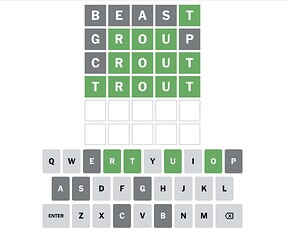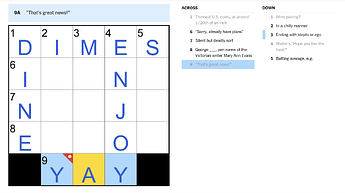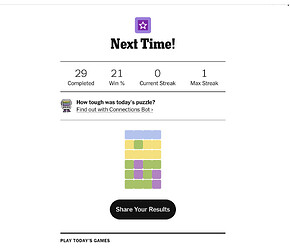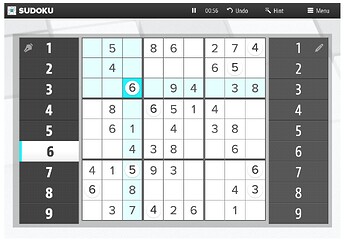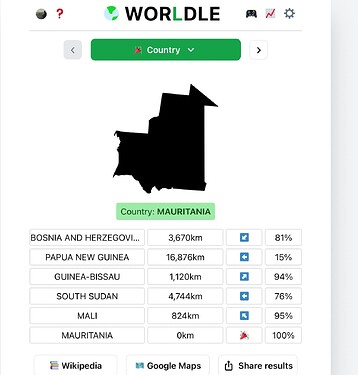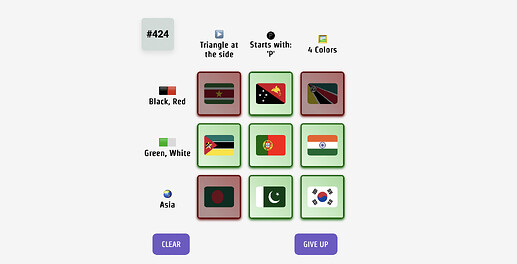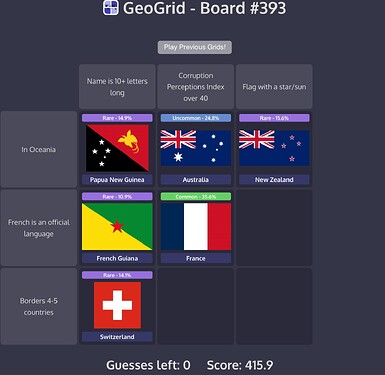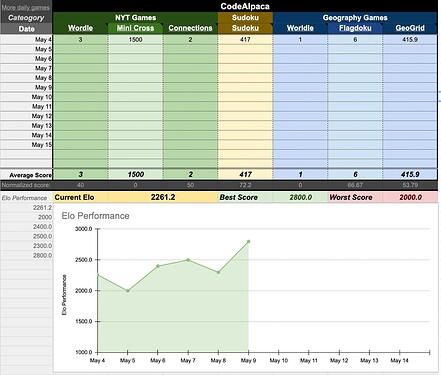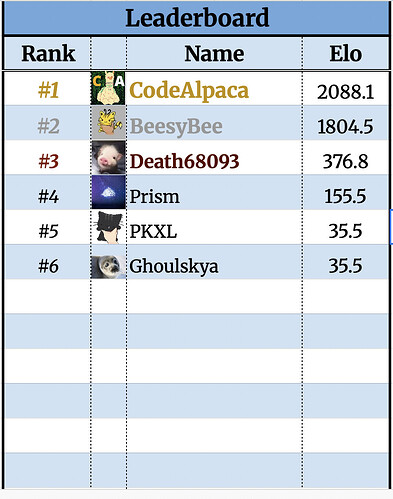Hello everyone!
No, I’m not “back” just hovering around as usual. But, I did have some time and decided to just make this for fun. I probably should do more productive things than this, but when I do something I sometimes become lightly obsessive over it lol.
How it works
Basically what is it, is a tracker for the various daily games such as Wordle, Connections, GeoGrid, etc. There’s no prize, just something to do entirely for fun if you’re into this sort of thing. So what you’ll do is complete these games, then you’ll get a score for it based on your result. Your average score will then become your “elo” (technically the wrong term to use), and that’s how you’ll be ranked. This includes 6 different games, but they’re all pretty quick because they’re daily games.
To mark down your score, you’ll need to DM me an email so I can add you to the google sheet to edit your specific page. It’s an honor system, so I trust you to put in the right scores for yourself. There’s nothing to be gained from cheating, as this is all just for fun anyways.
Every game is listed in the “The Games” section*
Truthfully what I expect to happen is for people to read this, think “oh neat” then completely ignore it. Which is fine, but just might be a cool thing if you do ever want to try it out. It’s something I enjoy, and just thought it just might be a more enjoyable experience with others.
The Games
The “New York Times” category
Constists of games made by the New York Times (not all of them, just a select few)
Wordle
Wordle, as you probably all know, is a game where you need to figure out what the word is. You do this by making various guessing to narrow it down.
How scoring works: You’ll just mark the number of guess it took to complete. If you got it on your 3rd guess, you’d just write down a 3. If you fail however, then you’d write down an 8.
Mini Crossword
The New York Times Crossword — The New York Times
A very tricky game if you don’t know how to do it. Basically you’ll have a 5x5 or 6x6 grid and need to fill in the missing words based on the hints you’re given for the column/row. It’s hard to explain, but is very simple when you know.
How scoring works: You’ll mark down the time it took you to complete the puzzle. So if it took you 4-minutes 37-seconds to complete, you’d write down 437. For scoring, because minutes are in groups of 60, it’s actually very important to beat minute markers. There is a 41 point jump form 459 and 500, so save every second you can.
Also, beyond 15 minutes, getting longer than this will actually hurt your score. So a score of 1500 will be a net neutral on your score, but anything longer will harm it. So you’re allowed to give up on it if you want (but it’s up to you, you’re allowed to keep going)
Connections
Connections — The New York Times
The game provides with a 4x4 grid with various words inside each box. You must pair 4 of these similar words together to complete a row, scoring you 1 point.
How scoring works: You’ll receive 1 point to mark down for each row you complete. You can get a maximum of 4 points here (it’s a smaller number than the other scores, but it’s multiplied in later calculations so it’s all weighted the same). If you fail this game, get 0, it does not harm your overall score (besides being a lower average than if you got it right)
Sudoku
https://www.washingtontimes.com/puzzles/sudoku/
The Washington Times sudoku is chosen for this instead of NYT because it is much easier, meaning you’ll actually be able to complete it in a reasonable amount of time if you know how to play sudoku. This is meant to be played on “Difficult” but if you’re still learning, you want be punished for playing on Hard/Medium/Easy, just please state you’re doing so.
How scoring works: However long you take is what your score will be. If you finish in 5-minutes 13-seconds, that’s a score of 513. Taking any longer than 15-minutes will harm your score.
Worldle
This is the same as Wordle, except now you’re guessing based on the outline of the country.
How scoring works: Scoring is the exact same as wordle, just put in however many attempts it took you (put in 8 if you failed to solve it, this harms your score, so you don’t want this)
Flagdoku
If you’ve ever played Pokedoku, it’s the same as that. You have a 3x3 grid, and each row/column has its own constraints that you must follow. This is based on the country flag, so you might get something like “Blue and White flag only” + “Is the same rotated 180 degrees.” The answer to that is something like Scotland or Israel.
How scoring works: You can get a score of 0-9 here, getting a high score is what you want to do. If you fail this puzzle, get 0 right, then this does not harm your score (besides being a lower average)
GeoGrid
Very similar to Flagdoku, except you’re asked more country specific questions rather than flag based ones. An example might be “Part of the commonwealth” + “Coastline on the Indian Ocean”, to which a possible answer is India.
How scoring works: The game automatically places you at 900 points. This is the worst score possible. The more unique countries you picked, the lower your score will be (e.g. picking something like Andorra instead of Germany). Completely failing this and getting a score of 900 does not harm you, besides being a lower average. When you complete this, you just mark down the score the game gave you.
How Scoring/Elo Works
Every game is weighted equally, being worth 100 total points if you’re perfect (impossible as it requires completing things in 0 seconds). This is subject to change, certain games may change to be more important if I find it’s better for balance. More details on scoring is listed in each game section, but here are some bullet points:
- Wordle: Failing gives a score of 8, which will harm you. You want to be 6 or lower (1 being best)
- NYT Mini Crossword: Beyond the 15-minute mark, this will harm your total score.
- NYT Mini Crossword: There is a 40 point gap between 4:59 and 5:00 just by how the system is set up, meaning you score a lot better if you can pass a certain minute threshold.
- Connections: Failing does not harm your score (getting a 0). This is subject to change possibly*
- Washington Times Sudoku: This is the same as the Mini Crossword, getting longer than 15-minutes will harm your score.
- Worldle: The same score rules as Wordle apply here.
- Flagdoku: Failing does not harm your score (getting a score of 0). This is subject to change possibly*
- GeoGrid: The score is based on what the game tells you. However, this can vary depending on the time you choose to play the game. Just input whatever score you seen at the time of completion. Failing this game does not harm your score (getting a score of 900). This is subject to possibly change*
- Scoring does not take into account game difficult. As it is commonly known, Monday puzzles are much easier on the NYT than Sunday puzzles.
- The more games you play, the more elo you’ll gain. This is to encourage/favor consistency, however it has diminishing returns. (Playing 2 games gives a +30 elo, 10 +100 elo, 20 +120 elo, 100 +200 elo, etc.) This fall off prevents you getting to the top by just spamming games.
- The “Elo” you’ll see won’t be some even multiple of 100. That’s because you’re not getting a perfect score, it’s various 43, 72, etc. combined together for all 6 games. Then this score is multiplied by 8 to be a more visually pleasing number. After that, then the “bonus score” for consistency of playing is added.
Example screenshots:
You would be allowed to roughly change the colors to look however you wanted. Overall visuals subject to be improved*
Final tip: What really helped me get better at geography is the site called Seterra (by GeoGuessr), it has great geography games.
Link to the actual sheet:
